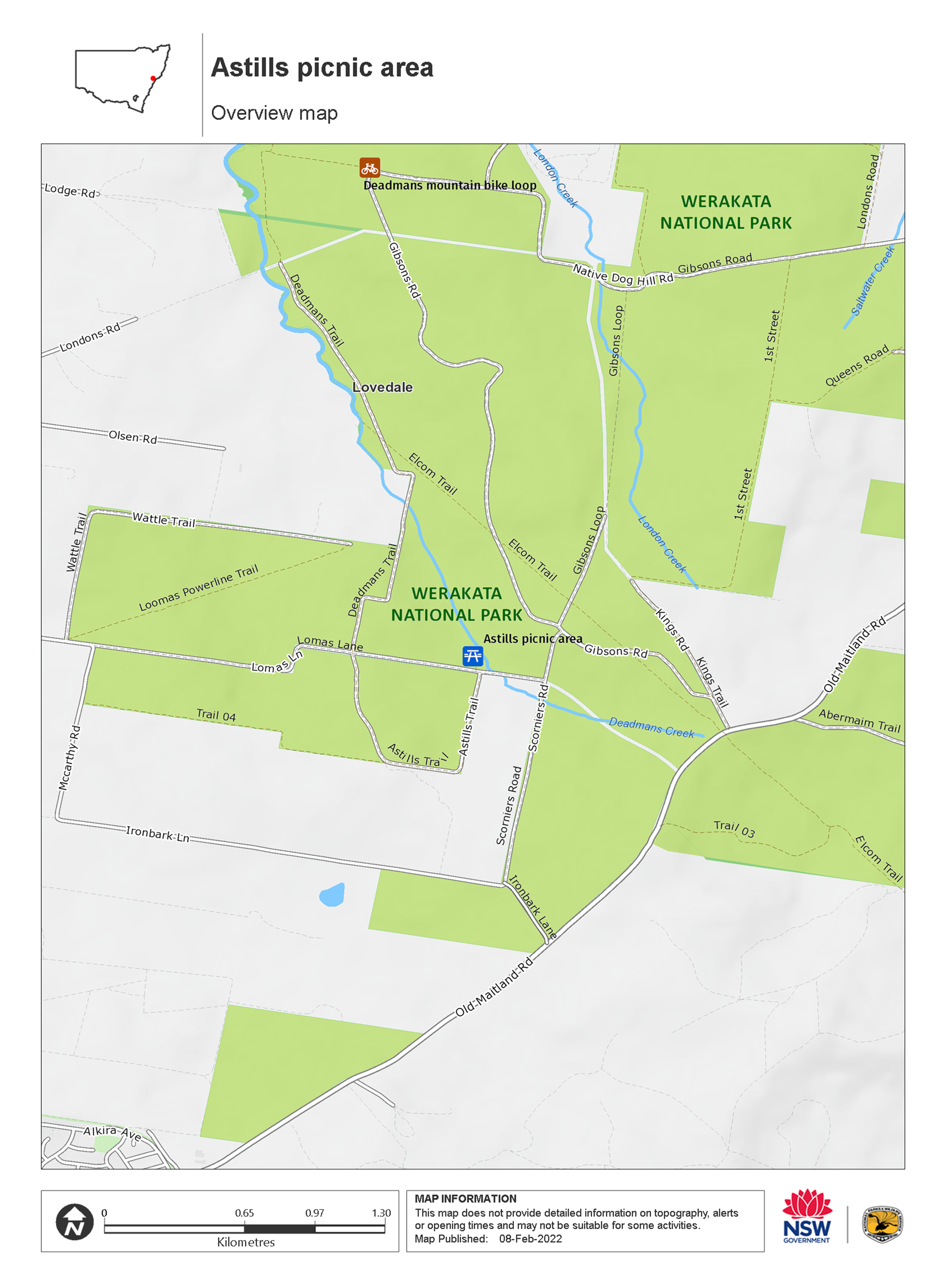Astills picnic area
Werakata National Park
Overview
Get together for a picnic near Cessnock under the shady gums at Astills picnic area, then head off for a bike ride through Werakata National Park.
- Type
- Picnic areas
- Where
- Werakata National Park in North Coast
- Accessibility
- Medium
- What to
bring - Drinking water, clothes for all weather conditions, sunscreen
- Please note
There is limited mobile reception in this park.
Astills picnic area is the ideal place for a feed. It’s rarely busy, and the picnic tables let you sit and take in the surroundings, with plenty of open grassy areas for games or chilling out.
Towering trees soar above you, so tuck yourself under the shade while reading a book. In spring, you’ll see lovely heath flowers like purple happy wanderer, yellow hairpin banksia, red mountain devil, and the pretty purple thyme honey myrtle.
After lunch ride the bikes around Deadmans mountain bike loop, an east 8km ride through Hunter Valley bushland. On a sunny winter’s day, rug up, pack the thermos and enjoy the amazing variety of birds from the comfort of your eucalypt canopy. Owls, speckled warblers, black-chinned honeyeaters, grey-crowned babblers, and serenading kookaburras, will keep you company.
Map

Map legend

Local alerts
For the latest updates on fires, closures and other alerts in this area, see https://www.nationalparks.nsw.gov.au/things-to-do/picnic-areas/astills-picnic-area/local-alerts
General enquiries
- National Parks Contact Centre
- 7am to 7pm daily
- 1300 072 757 (13000 PARKS) for the cost of a local call within Australia excluding mobiles
- parks.info@environment.nsw.gov.au
Park info
- in Werakata National Park in the North Coast region
Werakata National Park is always open but may have to close at times due to poor weather or fire danger.
Visitor info
All the practical information you need to know about the Astills picnic area.
Maps and downloads
Learn more
Astills picnic area is in Werakata National Park. Here are just some of the reasons why this park is special:
Blossoming with life

Spring wildflowers such as purple happy wanderer, yellow hairpin banksia and red mountain devil all bloom in Werakata National Park. There are also delicate ground orchids and lovely thyme honey myrtle sprinkled throughout the park. More than 200 native animal species have been recorded in the park and surrounds. You'll likely see tree-dwellers like gliders, possums and bats at night. Old favourites like wallabies can also be seen feasting on the luscious landscape. Lizards, like the common scaly-foot and Burton's snake lizard, might be a little harder to find, but keep looking. If you like birds, you’ll love Werakata. The abundance of ironbark and spotted gum, which flower in winter, attracts the threatened swift parrot and regent honeyeater. The trees’ blooms are an important winter food source for the birds and the park becomes a winter breeding ground. But there is a lot of birdlife all year round. Powerful owls, masked owls, various robins, and lorikeets can all be seen here, so be sure to bring your binoculars for some great bird watching.
- Deadmans mountain bike loop Deadmans mountain bike loop is an easy 8km cycle through rare Hunter Valley bushland. The trail starts near Astills picnic area and is a good choice for a family day trip.
Green in the valley

Conservation is a vital aspect of this national park. Check out Kurri sand swamp woodland and Hunter lowlands red gum forest, as they are home to endangered ecological communities. Werakata National Park has some special and endangered plants. Over 400 species of plants are known to exist here. Lower Hunter spotted gums and ironbark form part of the park's thick bushland, and are a rich source of food for the winter birds that flock here.

